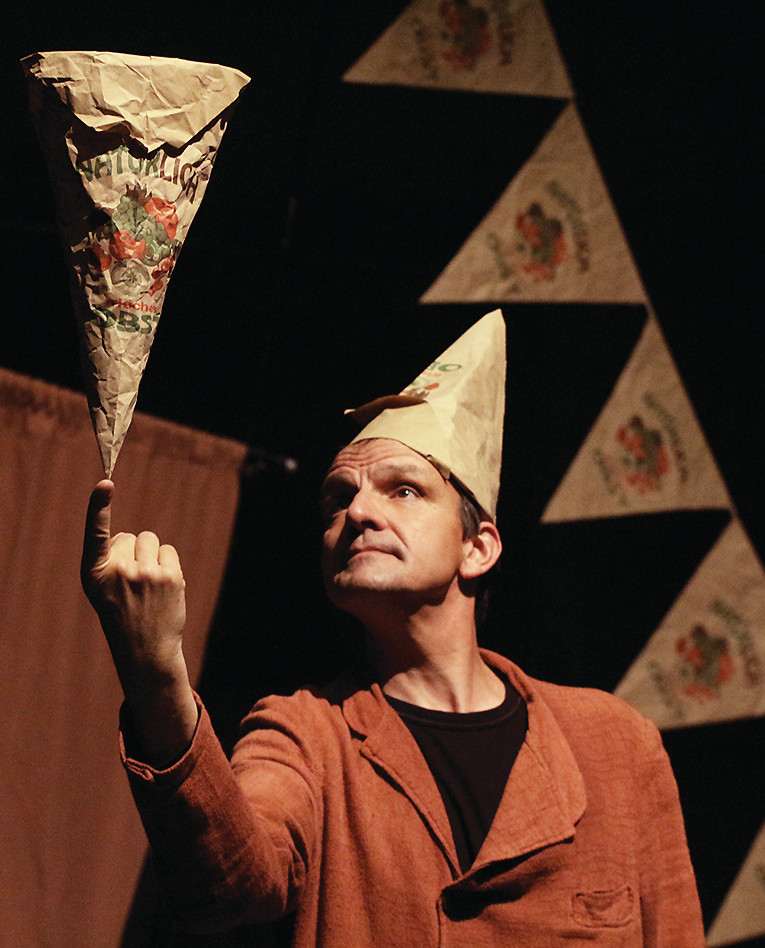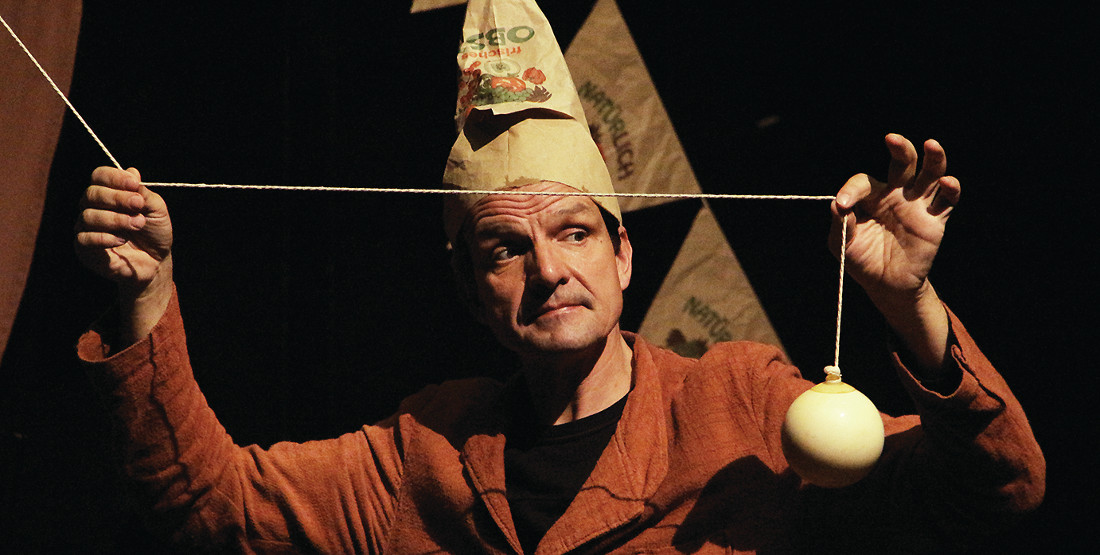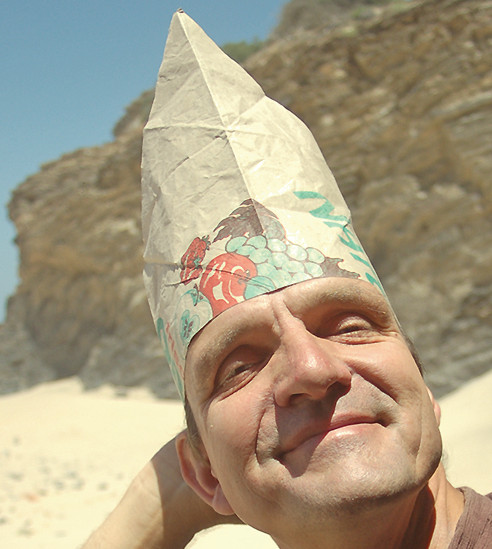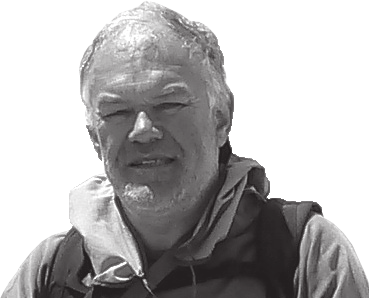What drives a clown? Where does this energy come from?
The driving force to leave everything behind and to say you don’t want to pursue your profession any more generates huge strength. It is the possibility to seek out and experience an absolute feeling of happiness. The path that I followed led me to a place where 20 people come together who write music, do choreography, who look for places that are abstract, who use a eucalyptus forest as a message and a stage. The impetus is different to 20 years ago. But the energy is the same. That you can reinvent yourself time and again with what you do. It is a permanent transformation, a permanent process of rediscovery.
Where does the person known as Tosta Mista come from, and where is he heading?
My grandparents lived on the Dutch border. I was born in 1969 and I’m only called Tosta Mista because no one here can pronounce my name. Tomorrow I’m going to Santa Maria da Feira near Porto…
And then?

To Funchal in Madeira. I’m performing at the book fair there for two days.
And then?
On Children’s Day, I’m performing at the auditorium in Alcochete, for children.
And then?
I’m in Torres Novas at a medieval fair. I play my court jester there, Bobo da Corte. And then I’m in Montemor-O-Novo near Évora at the spring fair. And, after that, it’s back to the Europarque in Santa Maria da Feira. I’ll be performing Die Papiertüten (The Paper Bags) in the Botanical Garden in Coimbra for the first time. Then I continue on to Guimarães …
In Germany, it is said, people go to the cellar to laugh (to do so in private)
But the Portuguese don’t build cellars under their houses. Here, you can laugh in the depths of a forest, or on the beach – or cry.
But it’s funny that a German should emigrate to Portugal with the aim of making people here laugh, and then become an entertainer.
On the one hand, it’s funny, but, on the other hand, it’s part of the métier of circus arts. For me, working in this industry means being on the move. I have always had itchy feet. You can see my build. I’m 1.85 metres tall, brown eyes, sometimes green too, a bit clumsy. That’s a big advantage, because people in Portugal love everything that comes from outside. A foreign artist has good opportunities here. And I’m a bit comical too.
Is your business model to act the clown?
It’s a blend of the gauche whiteface clown and technique. Comic juggling. In my work, there have always been different phases. Community as well as solo programmes, and even a travelling stage. At the beginning, the technical side was very important to me.
A head start through technique?
From the lathe to a unique art of juggling. A head start, in order to master a specific technique. The dream of simultaneously juggling five, six or seven balls. Those are also moving images.
Has one of the balls ever failed to come down?
I once lost a ball on the ferry from Naples to Palermo.
But they all reach the shore again, don’t they?
Our rubbish is always washed back on land again. In the process, a ball like that sometimes covers a long distance. As the years passed, I then realised that it’s possible without a technical aspect. The most important thing is having a presence. Being open to new ideas.
You have now got away from the balls and have arrived at paper bags.Why did that happen?
At some stage, I thought that the whole thing shouldn’t be called “juggling” any more, but rather “object manipulation”. This means that, through the traditional objects that you can practise with: clubs, balls, rings, hats… you can transfer the technique you have learned to other objects, to stones, or to everything that exists: the joy in the object, the object’s diversity. I actually hit on paper bags through a kind of memory. When I saw a paper bag hanging in a friend’s kitchen, the memory came back to me straight away. I took some paper bags with me and thought, perhaps I can use them for something.
Are these bags full of something, or are they empty?
They are full of a few drops of sweat and creativity, as well as research into their past. The whole thing also has its own name, o grande embrulho; in Gerrman I call it “Eingetütet” (“Bagged”). It’s not so easy to translate the Portuguese. It’s a play on words combining “a big parcel” and “a big mix-up”.
Bagged? How many bags do you go through then per evening?
That depends on the audience. I hope that one day it could be as many as 500.
Every evening?
Not every evening.
People in the audience or paper bags?
Bags and audience members. Of course it could be that there are some people in the audience with quite big heads and the bags are too small. Then there are fewer bags than people in the audience.
But you could use a bag like that for something else, couldn’t you?
They were actually made for packing fruit and vegetables, but no one does that any more these days. There are plastic bags for that after all. In my case, I put myself in the bags. The paper bag becomes detached from its original purpose. I put my hand in the bag and then a little puppet theatre is formed. O Grande Embrulho, humans in a waste-creating civilisation, also usable as an object for manipulation…
Do the bags actually have a political background with you?
Yes, an economic background. They have an informative background, providing information in the sense of instruction. It is about enchanting people through objects, but there is also an informative side, which comes later when you are dealing with the bag in the market hall or an aeroplane. You have a choice, about whether you pack your banana back in a plastic bag – before throwing the skin away again – or not, or an apple, freshly sprayed with insecticides and pesticides in a plastic bag, or an orange etc. …

Bags can be used for a whole lot of other things, can’t they?
Of course. To pass the time, making a sun protector on the beach. Or as a papal decoration on the way to Fátima, as Napoleon heading off to war, as Robin Hood, a bandit etc.
Do you prepare your clowning with thorough German care?
The text of my presentation talks about “the German with a Portuguese soul”. Something appears to be starting to develop in this soul, namely that I don’t take things quite so seriously any more.
What is the situation with you yourself? Do you still have something to throw away from time to time?
Oh yes, and I’m always amazed about how much there is still. Especially the wine bottles for the container. Yes, I still have things to chuck out, but less and less. I get by with less and less. I travel a lot in the summer months and then I have almost no rubbish. Other people throw the rubbish away for me when I eat in restaurants. It’s only possible to eat completely waste-free if you go to the market and have your things packed in paper bags. And afterwards you can do a lot of things with a paper bag.
By contrast, plastic keeps landing in our food chain: in the sea, in the fish, and then back into our stomachs. Do we have to pack everything two or three times, just to throw everything out with the rubbish? That doesn’t happen with a paper bag. How about at least having the choice between a paper bag and a plastic bag in a supermarket? What would consumers go for? My play is about paper bags being packaging that can be reused. Why shouldn’t we use it again later?
Have you ever worked out how much rubbish you yourself produce in a month?
I avoid rubbish and buy things in small shops. I go to supermarkets very rarely, almost never. We’re back to objects again. I find a supermarket interesting, but not for shopping. I always look at the people there. That’s part of my job. Sometimes I even disguise myself as a sales assistant. There are two sides to it. The supermarkets’ offering and people’s purchasing behaviour. Everything is becoming a bit more impersonal. So the staff won’t be needed any more…
Then we will be served by a robot which asks us…
…would you like a little bit more?
Solutions?
Jute instead of plastic. Paper and glass instead of plastic. Introducing deposit systems in Portugal. There are so many possibilities. You just need the will.
So, back to being German again after all? How long does a show last?
Between 20 minutes for children and an hour and a half.
When was the last time you were really happy?

Now. I’ll tell you how that happened. When I was following my dreams in those days, there was an energy that was still restless. I headed off along an unfamiliar path; I got involved in taking risks; not thinking about social security, and just doing what I love, to be happy. I really learned that in the first few years. And then when I learned to adapt to a new culture, to learn a new language, then I noticed what richness and happiness might mean. Enriching yourself by learning a new language, discovering new ideas.
For a long time, I had to defend my profession. When I arrived somewhere, people always asked me: and what do you do? When I said, I’m an entertainer, I’m a clown, I’m a juggler, people made a funny expression and asked, What are you doing here? Clown is more of a swearword than an expression for a profession. But by learning the profession, you gain diversity. Clowns themselves can arouse emotions in many different ways, thoughtfulness and many other feelings. In principle, I am concerned about how we deal with the basis for our existence on our planet, and how we deal with ourselves. What will it be like if no one shows you any more what being happy means? There’s lots more to talk about…
Thank you.
 Eco123 Revista da Economia e Ecologia
Eco123 Revista da Economia e Ecologia


